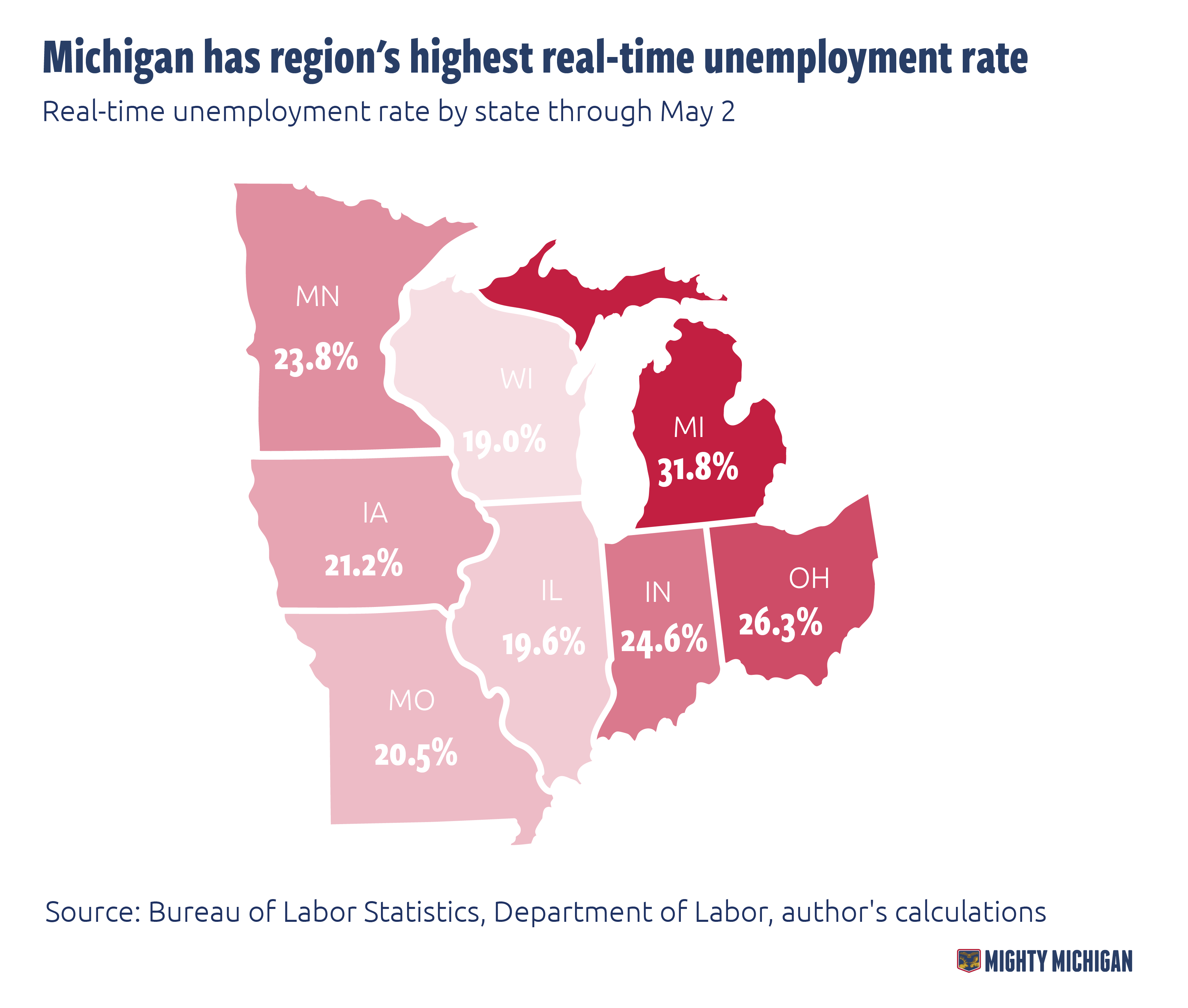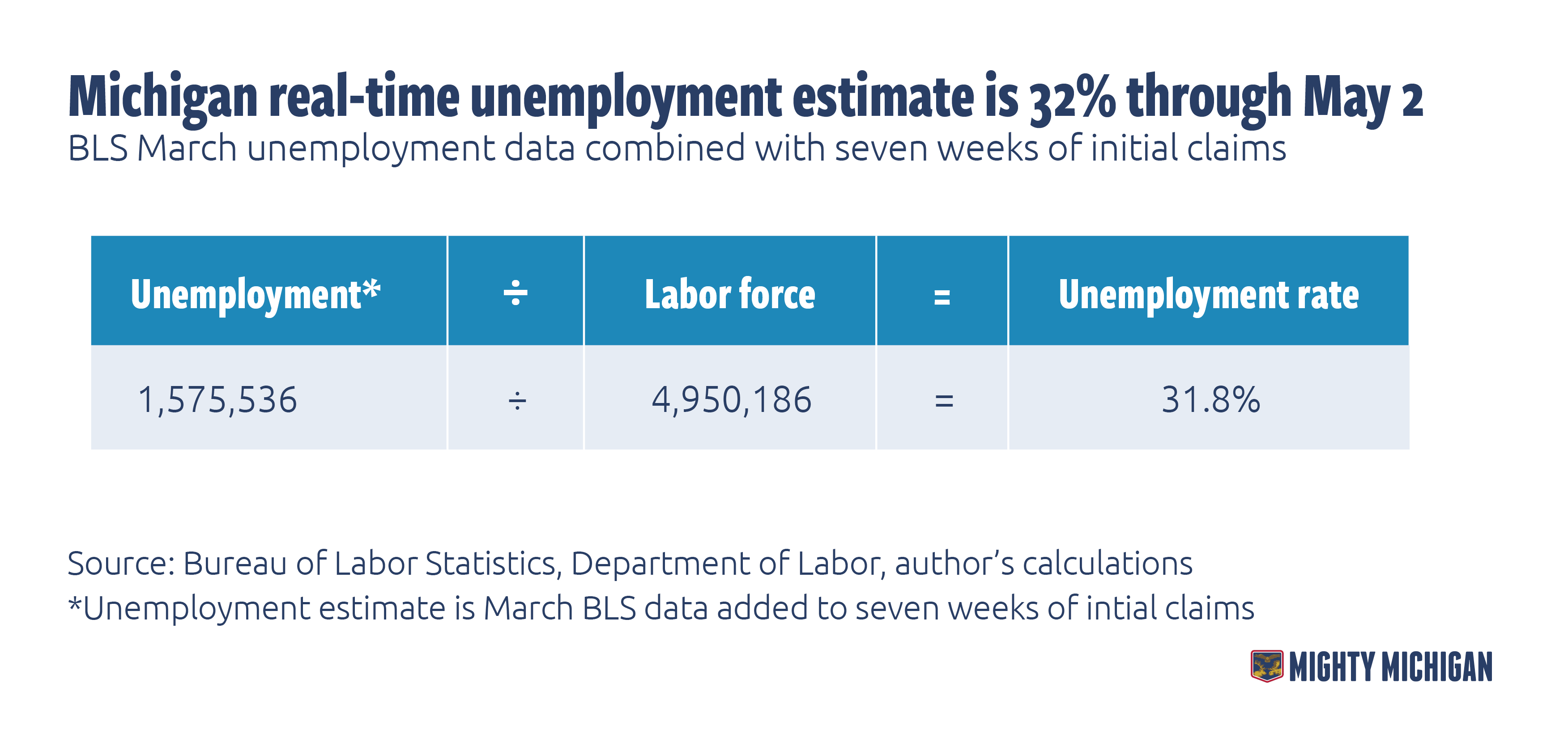Michigan has region’s highest real-time unemployment rate, with 1 in 3 workers out of a job
The Wolverine State is experiencing more job loss than any other state in the region – more than double that of the Great Recession.
The U.S. economy lost a stunning 20 million jobs in April, according to a Friday report from the Bureau of Labor Statistics, making April 2020 the worst jobs month in American history. The job losses reflect the coronavirus pandemic and efforts to contain it.
The national downturn has had an outsized impact on Michiganders. The Wolverine State is experiencing more job loss than any other state in the region, with a real-time state unemployment rate of nearly 32% through May 2. By comparison, other states in the region have real-time unemployment rates ranging from 19% in Wisconsin to 26.3% in Ohio.

The U.S. April jobs report gives a preview of the likely make-up of Michigan job losses. Leisure and Hospitality accounted for 7.7 million American jobs lost, while Professional and Business Services and Retail Trade each shed 2.1 million jobs. Manufacturing lost 1.3 million jobs and Healthcare lost 1.4 million jobs, a painful irony in the midst of a pandemic that demands the manufacture of more healthcare supplies.
One in three Michiganders who participate in the workforce were unemployed as of May 2, adding up to 1.6 million jobless residents, more the double the worst months of 2009 during the Great Recession. The Wolverine State has never seen so many unemployed.

Healthcare job losses indicate a profound impact for both healthcare providers and patients. Gov. Gretchen Whitmer’s executive order currently restricts Michiganders from undergoing critical medical procedures, leaving parents like Laura Alderton living in fear for when their children or grandchildren can have critical surgical needs fulfilled. Policy should be changed to allow more critical procedures to be safely performed.
Michigan is one of the 27 states that employs a workshare program for workers on unemployment insurance. Whitmer’s Executive Order 2020-57 expanded Michigan’s workshare to help employers reduce layoffs. Workshare is a key program for businesses to use, as it lets them keep workers on at reduced hours while allowing the worker to tap unemployment insurance benefits to make up additional lost wages.
Michigan’s unemployment insurance trust fund was relatively well-funded going into the pandemic recession. However, all states are facing unprecedented levels of unemployment that will draw down on state trust funds and drive many funds to insolvency. Michigan has an unusually high number of people on unemployment insurance.
But there’s good news. According to new guidance from the United States Treasury Department, Michigan can use some of the money it received from the federal CARES Act to backfill its unemployment trust fund, thereby maintaining jobless benefits while reducing the need to raise employer payroll taxes to replenish the fund.
Michigan should reform other tax provisions, such as allowing businesses to take net operating loss carrybacks so they can deduct this year’s losses against prior year gains in order to preserve liquidity. Michigan should abolish its partial taxation of business inventories for similar reasons – businesses should not face an undue tax burden that drains liquidity while they are suffering steep losses. Finally, Michigan should provide full expensing for new business investments as allowed for under section 168(k) of the federal Internal Revenue Code, which particularly benefits manufacturers.
Regulatory reform is needed to cut away layers of unnecessary red tape that stands in the way of business formation and job creation. For starters, Michigan should repeal its onerous certificate of need laws which restrict healthcare providers from adding new capacity. Occupational licenses from other states should be recognized in Michigan, and Michiganders should be afforded simpler ways to enter an occupation that is currently licensed.
Local government permitting requirements should be curtailed, and Michigan policymakers should embrace reforms that make it easier to start a home-based business. Michigan cities should consider Phoenix’s 24-hour city model to deregulate permitting and approval processes and foster start-ups.
Businesses across the Wolverine State are shut down, and state and local governments cannot convene as easily as they could before the pandemic. They can, however, work to re-open businesses in a safe manner and rethink which of Michigan’s budgetary, tax, and regulatory policies impede economic growth. Michigan policymakers can prepare a set of reforms to make Michigan a higher-growth state, which is exactly what the state’s 1.6 million unemployed will need when the economy re-opens.